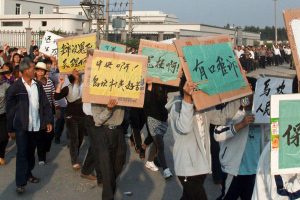The 3 C’s: China, Coal and Climate Change
Recent video of protests in China’s southern Guandong Province against new coal plant construction at the end of December 2011. According to recent reports, as many as 30,000 people took over a highway in the city of Heiman in an effort to block another coal-fired power plant from being built. And this comes on the heels of similar protests over confiscation of farmland and other energy development projects in parts of China, as well as local autonomy movements.  The protests in Wukan and Heiman in particular are noteworthy for not only their length, but also their scope–months of protests which led to the expulsion of state officials and arrests, and a lengthy stand-off with Chinese officials by local activists. The China Law and Policy blog has a really interesting write-up on the details and significance of these movements here, and what they mean in a larger context for Chinese politics.
The protests in Wukan and Heiman in particular are noteworthy for not only their length, but also their scope–months of protests which led to the expulsion of state officials and arrests, and a lengthy stand-off with Chinese officials by local activists. The China Law and Policy blog has a really interesting write-up on the details and significance of these movements here, and what they mean in a larger context for Chinese politics.
The tale of Wukan village is not an uncommon one in China. Rural farmland is constantly taken by corrupt village officials for real estate development and the villagers – the owners of the land through the collective – receive little to any compensation. For certain Wukan’s story is a little different from other run-of-the-mill land taking protests: the length of the protests (close to three months), the unity of the group (close to 20,000 villagers), the complete expulsion of the Chinese government from the village, the death of a protest representative in police custody, and the attention from the western media distinguishes Wukan from other taking protests.
As Elizabeth Lynch argues in the China Law and Policy:
But there is certainly something happening here….I’m just not so sure what it is and perhaps it is still too early to determine if Wukan is in fact a harbinger of something more. Protests in China against rural land takings and the lack of just compensation occur on an almost daily basis. But in Wukan, these protests were large, public and extreme. Add to the mix that one of the protest leaders died while in police custody…Will the government change this paradigm [of real estate driven, farm land expropriation growth] and provide equal property rights to villagers? Right now it is unclear. Wukan seems to have ended in the same way as all of these protests do. But perhaps this time the central leadership will realize that constantly involving itself in these local protests is unsustainable.
Whether or not this will be something more than just an extended and local protest movement remains to be seen. So for now, all we can do is wait and see what happens there…
In other climate change news, Republican Presidential nominee-hopeful Mitt Romney, always a reliable expert on climate change and global warming, had this to say on the campaign trail (below.) You can read more here on all of this.
Mitt Debates Mitt on Climate from Sierra Club National on Vimeo.
And in equally amusing other news, the oil and gas folks are upset at Obama again. The Huff Post reports that:
The oil industry’s top lobbyist is warning the Obama administration to approve the Keystone XL oil pipeline or face “huge political consequences” in an election year.
Jack Gerard, president of the American Petroleum Institute, said it would be a “huge mistake” for President Barack Obama to reject the 1,700-mile, Canada-to-Texas pipeline. Obama faces a Feb. 21 deadline to decide whether the $7 billion pipeline is in the national interest.
Speaking at the trade association’s annual “State of American Energy” event Wednesday, Gerard said: “Clearly, the Keystone XL pipeline is in the national interest. A determination to decide anything less than that I believe will have huge political consequences.”
Well, one thing is for sure. If you define ExxonMobile, Shell, BP, and Haliburton as the players who decide the “national interest” of the US, then absolutely, YES, the Keystone XL pipeline is in the national interest (I’ve already written about some of the Keystone politics here). If however, you are worried about things like fresh water, drinkable water, a long-term, non polluting economy or anything else along those lines–rather than, say more Alberta Tar Sands madness, then this should be a no-brainer for Obama. No on the Keystone XL pipeline is the right thing to do for the “national interest” of this country (not to mention the world).
Until next time…
###


